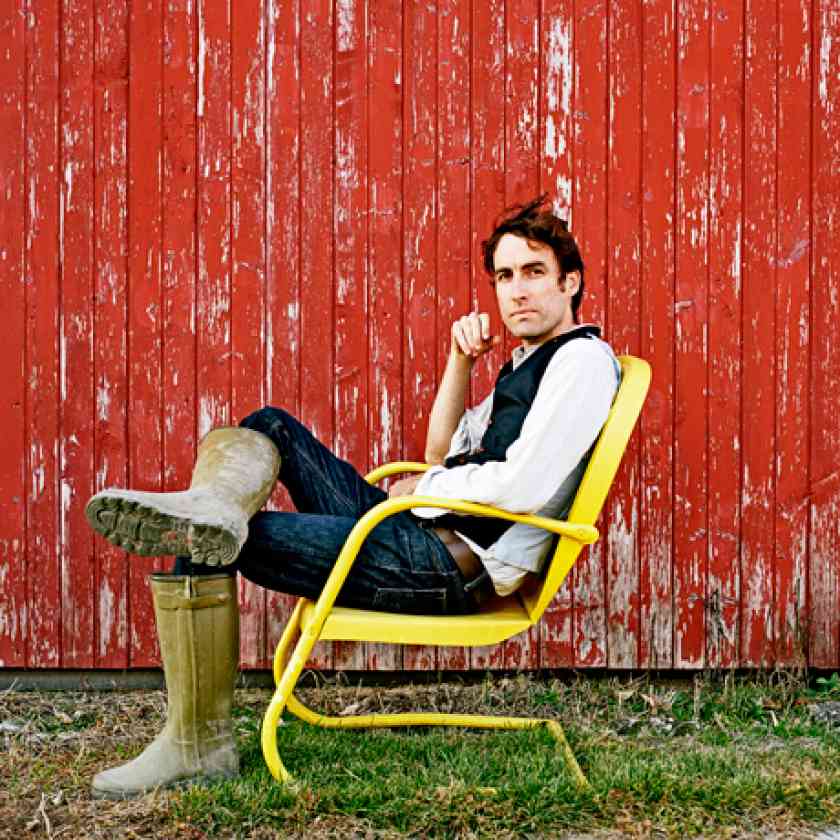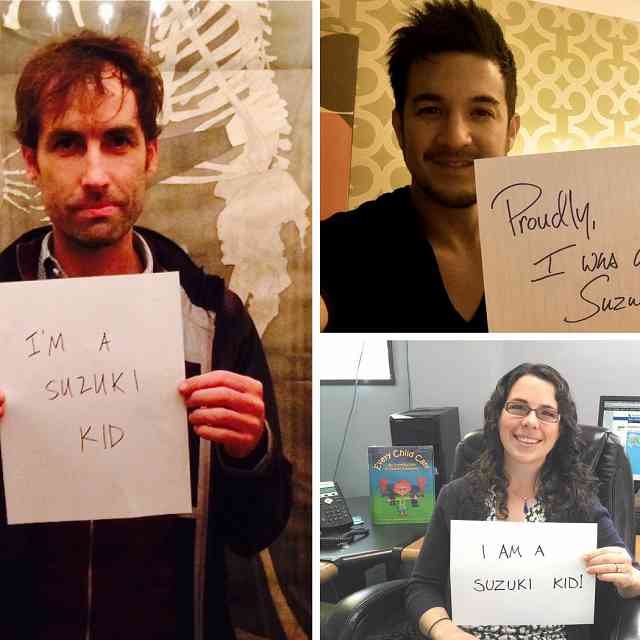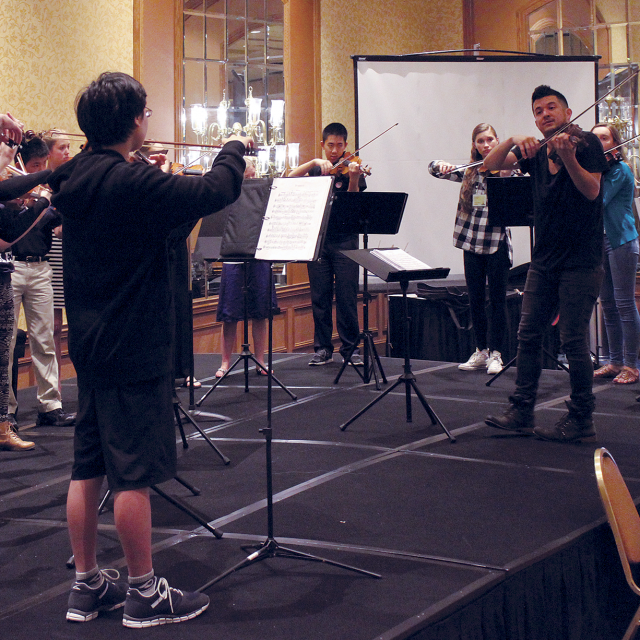
Photo by Cameron Wittig
Chicago-based film score composer, multi-instrumentalist and lyricist Andrew Bird began his musical journey on a “box” violin at the age of four and spent his formative years as a Suzuki student.
Bird later became interested in a variety of styles including early jazz, country blues and gypsy music, synthesizing them into his unique brand of pop. Since beginning his recording career in 1997 he has released eleven albums, his first solo record Weather Systems coming in 2003. Bird has gone on to record with the Preservation Hall Jazz Band and perform at venues including Carnegie Hall, the Austin City Limits Festival, the Hollywood Bowl and the TED conference. Most recently Bird composed his first-ever film score for the movie Norman, contributed to the soundtrack of The Muppets and collaborated with inventor Ian Schneller on Sonic Arboretum, an installation at New York’s Guggenheim Museum and Chicago’s Museum of Contemporary Art. His much-anticipated twelfth album Break It Yourself is due March 6, 2012.
What were your favorite experiences as a Suzuki student?
Well, I went to Stevens Point every summer for maybe seven years and I really enjoyed that whole process. Dr. Suzuki would come and we’d all play in this gymnasium, all the different levels playing at once. Seeing that as a little kid—it was an enormous spectacle.
I’m really grateful that the style of Suzuki I grew up with was pretty true to the “learning by ear” and the “mother tongue” concept. That’s had a huge impact on the kind of musician that I am.
If reading were the emphasis, I think I would’ve turned out different. The notes were there in front of us but they were just kind of part of the ceremony of playing. It was purely by ear. Then we had group lessons and private lessons once a week and it was very social. My mother was very engaged. She would come to everything and she actually started playing (violin) with me the first year.
I’m more grateful for the Suzuki Method than any musical opportunity that I’ve had.
Musically, what is most important about it is that, since I didn’t learn to read music right away, I made a direct connection to what was in my head. That allows the music to not just go in my ear but also come out of my head and onto my instrument. And as a writer, composer and improviser—when I made that leap from classical rep to folk music or jazz over the years, it was not a big leap. And I saw other musicians around—people at conservatory—that couldn’t move left or right without the written notes
I’ve heard the Suzuki Method described as learning “from the inside out” instead of “from the outside in.”
Yeah, it’s that direct connection. There’s no middle man. If I hear it, I can play it—just like if you hear it you can sing or whistle it. It’s just second nature.
Your mother was your primary practice partner. What kinds of musical experiences did the two of you share?
Since she was young she had this kind of notion of her kids playing music and she had certain pieces in mind—like a piece by Boccherini that she always imagined we would play. I remember practicing with her when I was very young and she would say “How about we play Minuet 1?” and I’d say, “Okay, how does it go?” And she’d start singing it and she would get carried away and sing a little too long and I would get frustrated and think, “All she has to do is sing the first two notes and I’d have it,” and I would say “Okay! Okay!”
I don’t remember there being much drama with her trying to get me to practice. I was pretty willing. I started when I was four and it was all games for the first year, and then teaching the kid to respect the teacher and the next thing you know you’re eight and you can pretty much play.
So it sounds like practicing was not a struggle for you. Did you ever get to a point where you wanted to quit?
No, not really. In high school there was a little bit of push-and-pull between sports and music but, at that point, I was clearly a lot further along in music than I was in tennis or soccer. So there was a little bit of competing for after-school time but never any real crisis. By the time I got to high school—you know, you go through that period in adolescence when nothing is going particularly well. Things are rough socially or academically. That’s when I really turned to practicing—around age thirteen or fourteen.
It was hard, though, to make the switch from Suzuki to the high school orchestras, all-state, competition or Interlochen. That was rough. But I didn’t ever want to quit. That was not fun. Having to learn how to read and competing for chairs—on top of puberty— wasn’t easy. But the solution never occurred to me that I would quit.
You’ve appeared as “Dr. Stringz” on Jack’s Big Music Show, you’ve collaborated with Dan Zanes and the Muppets and worked with “Rock for Kids” to establish the Andrew Bird Scholarship. Your actions show a commitment to kids and music education. Why is this kind of work important?
Because I was fortunate. I was nurtured. I had lessons every week and, like I said, by the time I was 8 I hardly knew what had happened and I could play. Not many kids have that kind of environment and I think it’s unfortunate because it came in really handy during the rough “Who am I?” years to have something that you’re good at. Something that’s unique.
It’s not that we’re training future musicians. That’s not it at all. Music makes your life richer.
So I think when school budgets are getting cut—what is seen by a lot of people as being esoteric (music and arts programming) is anything but. People miss the point. It’s not that we’re training future musicians. That’s not it at all. Music makes your life richer. It’s the reason to work so hard, to get up in the morning. And, whether or not you become professional, it does so much for you that you can’t quantify.
Which is what Dr. Suzuki believed—that by creating this rich musical environment, children would become good people with peaceful hearts which, in turn, would make the world a better place. What role do you feel arts education plays in character building and even world relations?
I am with Dr. Suzuki on that. It creates different people with different values. Values that go deeper than the pursuit of money and material things. I think that can go as far as people communicating better, resolving conflicts—you know, just general social grace. And it’s just, again, unquantifiable.
Who were some of your most influential teachers?
Well, my first main teacher was Andrea Shriver up in Lake Forest where I grew up. Those were the formative years. She was the main Suzuki teacher that I had.
That’s another thing… not to down play any teachers themselves… but Suzuki also gave me the ability to teach myself. I stuck with it (the Western classical tradition) all the way through conservatory until I was twenty-one or twenty-two. I really could’ve gone off on my own earlier but I’m glad I stuck with it.
You’ve used the word “geometry” in reference to the violin. Could you speak more about that?
I don’t know if my theories on that are ones that any teachers would… maybe they would?… be with me on this one. But I remember being in conservatory, and after I had played a piece in front of the class my teacher said, “By all accounts of technique and pedagogy you shouldn’t be hitting those notes… But you are.” And, again, I think that I owe that to Suzuki, too.
Even to this day I’ve resisted mapping out my fingerboard completely. It can still be a shot in the dark sometimes. It’s like whistling or singing. It’s an unfretted instrument. I’ve always been able to connect faster with my ears.
You know, I did my shifting technique—I did absorb all of that but it’s not like a grid in my mind, especially the higher fingerboard stuff. I just kind of feel it out. And that’s a bit tricky because how do you teach that? That just comes from the immersion.
I’ve read that, when you compose, you don’t write anything down. When a musical line emerges, does it come to you in a particular timbre or do you choose the instrument that will sing it?
I usually decide that when I’m recording. I have certain instruments within reach and I make kind of instinctual decisions on what to reach for at any given moment. Certainly the whistling ends up in there more than I ever plan it to—just because, usually, my hands are occupied playing the chords and it’s an easy way to carry the melody when you’re multitasking. And it ends up cutting through all the other textures in a really nice way.
But, yeah, I’ll mix the glockenspiel with the whistling. And I’ve arranged my setup so I can get a full range with the violin. I can get lower frequencies, like cello sounds, with an octave pedal. I can get all of the full range of a string orchestra and then use other instruments like guitar and the whistle—which is really “treble-ly” and cuts through everything. That’s the palette for the most part. And I add textures and distortion.
I think the way I make music starts off kind of improvised and then, through looping technology, I can almost begin to say, “Hmmmm, I could add that,” like a painter, or “Hmmm that needs a little more G and a little less E,” and kind of sculpt it. It’s a very recent tool. Composers didn’t have that until about twenty years ago.
But no, I don’t write anything down. Melodies pop into my head throughout the day. They’ll kind of completely take over and possess me for an hour or two. And I won’t panic that I don’t have a voice memo or a piece of paper handy to capture it. I trust that, if the melody is really strong, then it will pop back up. It just kind of goes down into your subconscious for a while and then percolates and then pops back up when you feel the same way that you did when it came up.
The piece “Belles” on your upcoming album sounds to me like watching the sun set from a porch on the prairie—in fact, it includes crickets. You seem to find music everywhere—crickets, the texture of moss. Has it always been that way or is this something that has evolved?
You shouldn’t ever underestimate what a child can internalize from what a teacher says—everything you say. You think they’re not listening but they really are.
I think, from an early age, that’s another thing that I got from Suzuki: tone. Because of that that early connection from ear to instrument I was particularly attuned to the resonance of my instrument. I’m very sensitive, to this day, to textures and timbres and what they evoke or make you feel. I remember being little and the sound of a pedal steel guitar in country music in the ‘70’s made me feel a little woozy. And it’s not just violin. The timbre of a snare drum can evoke completely different things—subtle differences in the way that textures are in there and it just has an emotional immediacy. So something like “Belles” is purely texture. It’s not especially melodic.
When I was little I would play one note—one particularly resonant note for an hour trying to spin the resonance of the note off and finding how each note kind of triggers certain harmonics. And later my teachers would always say, “You have really good tone.” They would say other things like “Practice your etude,” but after a string of things I was not doing right they would say, “You have very good tone. You are very musical.” And I heard that—even when I was little I heard that and thought “Well, I’ve got that. I’m going to keep getting better at that.”
You shouldn’t ever underestimate what a child can internalize from what a teacher says—everything you say. You think they’re not listening but they really are.
If you could offer your younger, Suzuki self or Suzuki students today any advice what would it be?
Put your instrument down for a few minutes and just listen. Immersion is important. Listening is as important as playing.
Don’t be discouraged. Violin, in particular, is a very difficult, sometimes physically difficult and painful instrument to learn to play. There are various stages when you do one little thing wrong and everything kind of falls apart and you have to piece it back together. I would just say don’t be discouraged—don’t give it up just because of peer pressure or frustration. It’s a long road to learning an instrument.
I also tell kids to sometimes just listen—you know, listen to music. Put your instrument down for a few minutes and just listen. Immersion is important. Listening is as important as playing.
Lastly, my student, Kiki, asks, “What is your favorite piece from the Suzuki violin repertoire?”
I remember liking Humoresque by Dvorak. Later on, I became a fan of Dvorak and played a lot of his pieces—like his violin concerto. I think maybe I liked the folkiness of it—it’s a little bit gypsy.
Through honoring his Suzuki roots, giving back to the community and pursuing a thoughtful, life-long exploration of sound and texture, Andrew Bird is a living example of Dr. Suzuki’s adage “Beautiful tone, beautiful heart.” For more information, visit AndrewBird.net and be sure to check out his upcoming album Break It Yourself.








